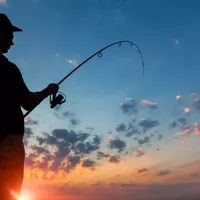Ahmad goes fishing
Ahmad||
Ахмад|йде|риболовлю
Ahmad||
Ahmad geht angeln
Ahmad se va de pesca
Ahmad va à la pêche
Ahmad va a pesca
アーマド、釣りに出かける
아마드가 낚시하러 가다
Ahmad vai à pesca
Ахмад идет на рыбалку
Ahmad balığa gidiyor
Ахмад рибалить
艾哈迈德去钓鱼
艾哈邁德去釣魚
Ahmad is ready for bed.
Ahmad||||bed
|está|pronto|para|cama
Ahmad ist bettfertig.
Ahmad está listo para irse a la cama.
Ahmad est prêt à se coucher.
It is 11 o'clock at night.
é||horas|à|da noite
Es ist 11 Uhr nachts.
Son las 11 de la noche.
Il est 11 heures du soir.
He wants to get up early the next day.
ele|quer|verbo auxiliar|levantar-se|levantar|cedo|o|próximo|dia
Er will am nächsten Tag früh aufstehen.
Quiere levantarse temprano al día siguiente.
Il veut se lever tôt le lendemain.
The next day he plans to go fishing at the harbour in Saltcoats.
||||||||||harbor||Saltcoats
||||||||||порт||Солткоутс
||dia||planeja|||pescar|||porto|em|
Am nächsten Tag will er im Hafen von Saltcoats angeln gehen.
Al día siguiente planea ir a pescar al puerto de Saltcoats.
Le lendemain, il prévoit d'aller pêcher au port de Saltcoats.
Fish wake up early.
fish|||
Риба|||
Fische wachen früh auf.
Los peces se despiertan temprano.
Les poissons se réveillent tôt.
They look for food early in the day.
Sie suchen früh am Tag nach Nahrung.
Buscan comida a primera hora del día.
Ils cherchent de la nourriture tôt dans la journée.
They look for food late in the day.
||||пізно|||
يبحثون عن الطعام في وقت متأخر من اليوم.
Buscan comida a última hora del día.
Ils cherchent de la nourriture en fin de journée.
The best time to go fishing is early or late in the day.
Die beste Zeit zum Angeln ist früh oder spät am Tag.
La mejor hora para pescar es a primera o última hora del día.
Le meilleur moment pour pêcher est tôt ou tard dans la journée.
That is when the fish are hungry.
Das ist der Zeitpunkt, an dem die Fische hungrig sind.
Es entonces cuando los peces están hambrientos.
C'est à ce moment-là que les poissons sont affamés.
When the fish are hungry, it is easy to catch them.
|||||||||catch|
Wenn die Fische hungrig sind, ist es leicht, sie zu fangen.
Cuando los peces tienen hambre, es fácil capturarlos.
Lorsque les poissons sont affamés, il est facile de les attraper.
Ahmad sets his alarm clock.
Ahmad|sets|||clock
|встановлює|||
Ahmad stellt seinen Wecker.
Ahmad pone el despertador.
Ahmad règle son réveil.
He sets his alarm for 5 o'clock in the morning.
|||будильник|||||
Er stellt seinen Wecker auf 5 Uhr morgens.
Pone el despertador a las 5 de la mañana.
Il règle son réveil à 5 heures du matin.
The next day he wants to go fishing at 6 o'clock in the morning.
Am nächsten Tag will er um 6 Uhr morgens zum Angeln gehen.
Al día siguiente quiere ir a pescar a las 6 de la mañana.
Le lendemain, il veut aller pêcher à 6 heures du matin.
He wants to catch four or five fish.
|||піймати||||
Er will vier oder fünf Fische fangen.
Il veut attraper quatre ou cinq poissons.
If he catches four or five fish, he could eat fresh fish all week.
||||||||||fresh|||
||||||||||свіжа|||
Wenn er vier oder fünf Fische fängt, kann er die ganze Woche über frischen Fisch essen.
S'il prend quatre ou cinq poissons, il pourra manger du poisson frais toute la semaine.
Fresh fish is the best fish.
Frischer Fisch ist der beste Fisch.
Le poisson frais est le meilleur poisson.
Ahmad goes to bed.
Ahmad|||
Ahmad geht ins Bett.
Ahmad va se coucher.

